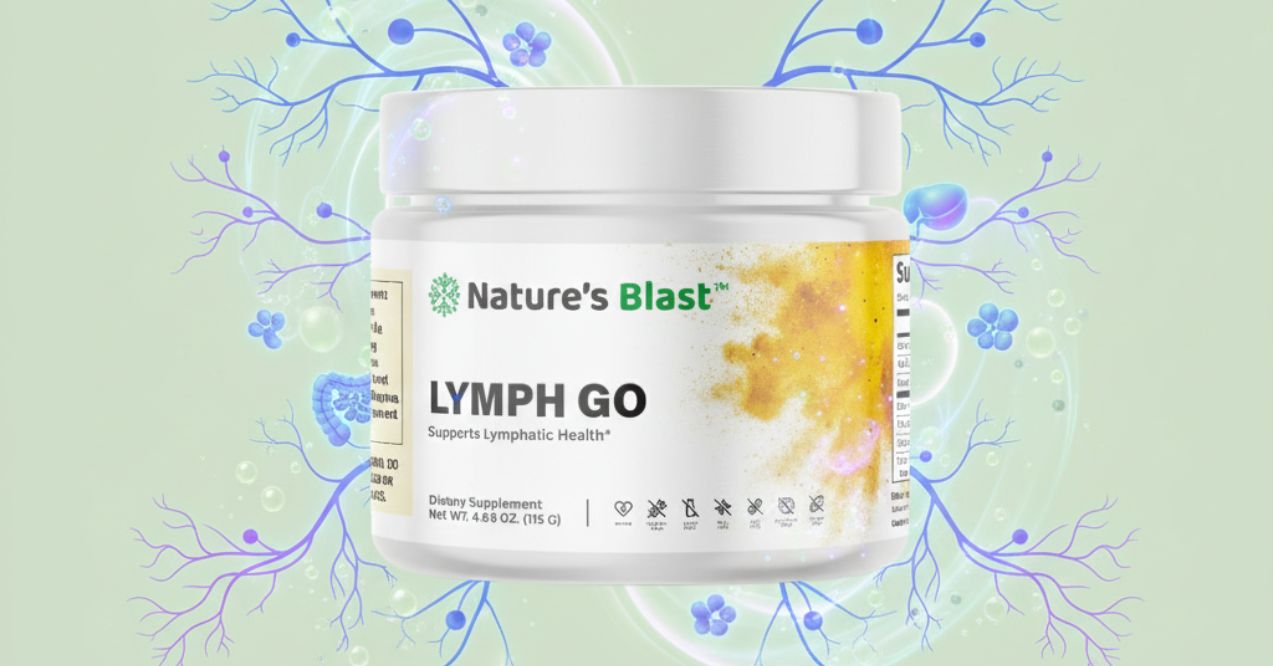Lymph Go Ingredients List: What’s Inside the Formula?
Medically reviewed by our experts
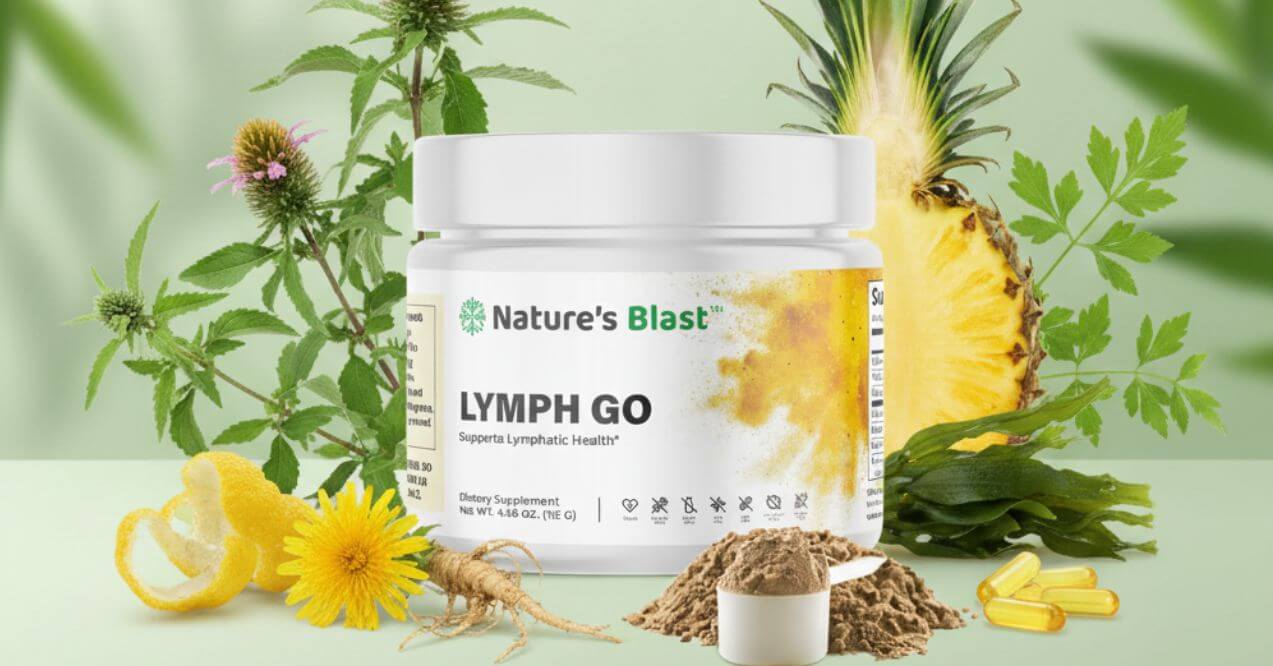

The Lymph Go ingredients list reveals eight natural components working together. Each ingredient serves a specific function in your body’s fluid systems. This formula combines traditional herbs with modern enzyme science.
Knowing what’s in your wellness products helps you make informed choices. Transparency matters when selecting supplements that align with your health goals. This guide breaks down each component and its role.
What’s the Purpose Behind This Formula?
This formula supports your body’s natural drainage processes. The blend maintains healthy fluid circulation and lymphatic tone. Each ingredient was selected for traditional use and functional properties.
The formulation avoids harsh stimulants or unnecessary additives. It relies on well-studied herbs and enzymes that promote internal balance. The goal is gentle, consistent support rather than aggressive intervention.
Key principles behind this blend:
- Simplicity – focused herbs and enzymes with high impact
- Synergy – ingredients chosen to complement each other’s function
- Clean-label – free from unnecessary fillers or synthetic compounds
- Supportive action – designed to promote function, not override it
This approach creates a formula that works with your existing systems. Lymph Go combines these principles into a powder supplement that dissolves easily. The eight-ingredient blend helps maintain normal fluid balance daily. Each serving delivers measured amounts of herbs and enzymes traditionally used for wellness.

Lymph Go Ingredients List: What Each Component Does
This section provides a detailed breakdown of each ingredient in the formula. You’ll discover what each component contributes to the overall blend and how these natural elements work together to support lymphatic health. Understanding each ingredient’s role helps clarify how Lymph Go’s ingredients list delivers balanced, targeted support for your body’s natural cleansing and fluid movement processes.
1. Echinacea Purpurea
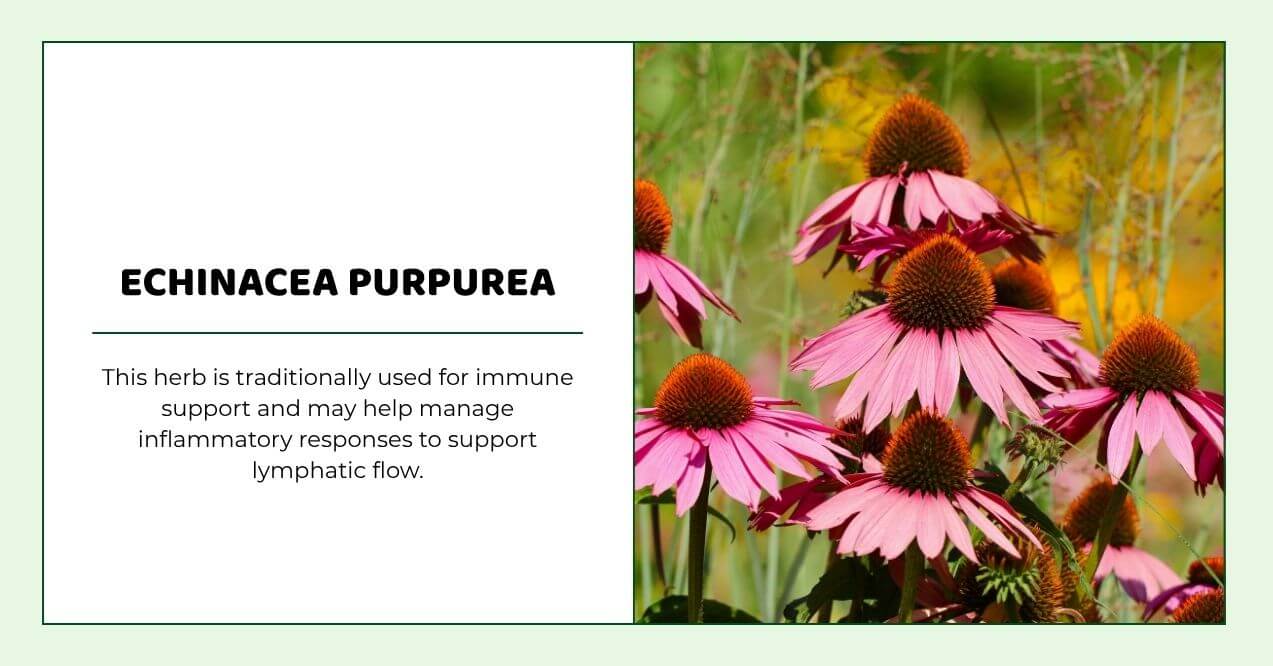
Echinacea is a flowering plant from the daisy family. Traditional herbalists have used it for generations for immune support. The herb may influence how your body manages tissue fluids.
Research suggests echinacea helps with inflammatory responses in our bodies which in turn supports healthy lymphatic flow. Its active compounds may support fluid movement through lymphatic vessels. The herb’s role extends beyond immunity to include drainage pathway support.
2. Bromelain
Bromelain is an enzyme extracted from pineapple stems. This enzyme breaks down protein compounds in body tissues. It may help reduce protein buildup affecting fluid dynamics.
Enzymes like bromelain potentially support tissue comfort and fluid movement. The compound may also improve absorption of other herbal ingredients. Its inclusion adds an enzymatic dimension to this plant-based formula.
3. Dandelion Root
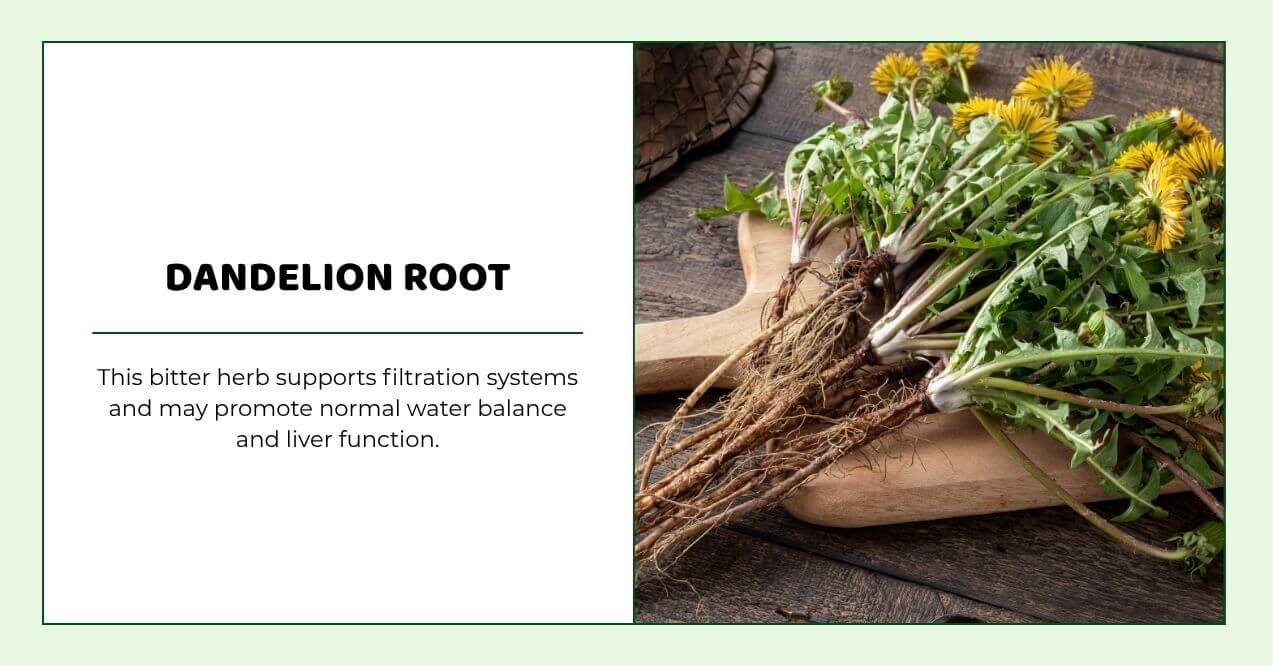
Dandelion root is a traditional herb supporting filtration systems. The bitter compounds in dandelion may stimulate internal elimination pathways. This herb has been used to promote normal water balance.
The root potentially supports liver function and fluid circulation. Its natural properties may help your body manage excess water. Dandelion works well when paired with other cleansing herbs.
4. Cleavers
Cleavers is a gentle lymphatic herb with long historical use. Traditional practitioners valued it for supporting fluid transport through tissues. The herb may aid natural drainage from areas where fluid accumulates.
Its mild action makes it suitable for daily use. Cleavers potentially helps maintain lymphatic fluid flow throughout your body. The herb’s traditional reputation centers on its drainage-supporting properties.
5. Burdock Root
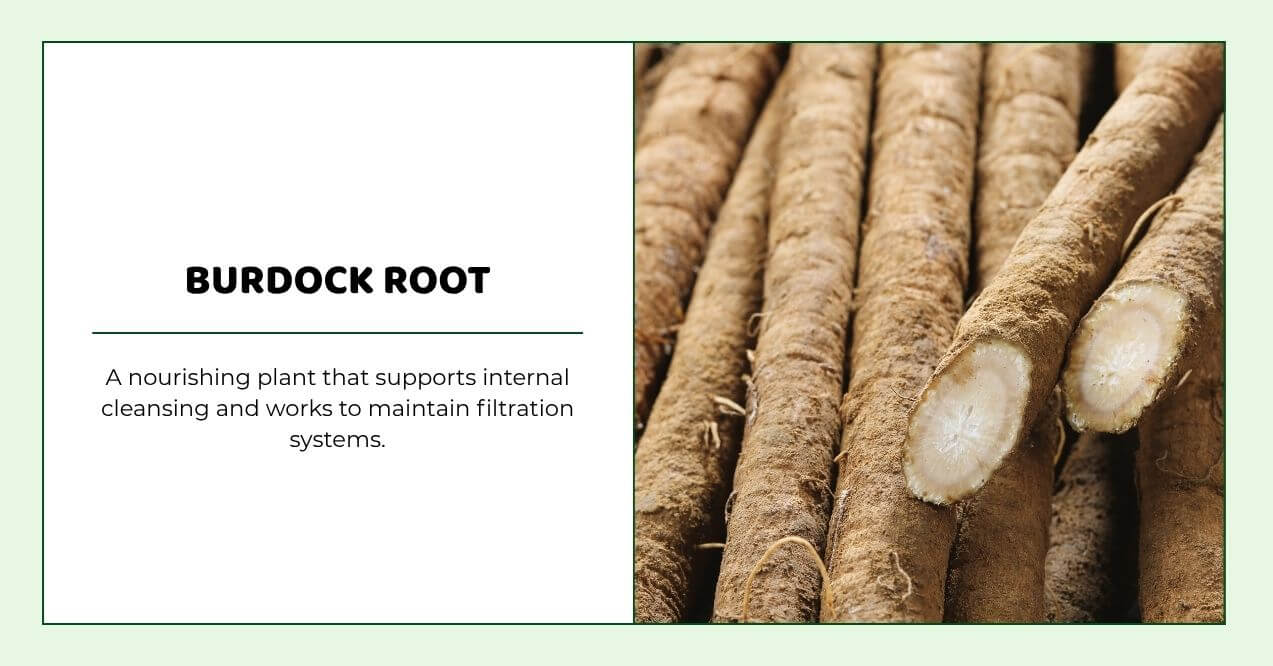
Burdock root is a nourishing plant with broad traditional applications. The root may support internal cleansing and cellular waste movement. Its compounds potentially help maintain skin and tissue clarity.
Burdock works with dandelion to support filtration systems. The root contains phenolic acids and plant compounds promoting detoxification. Its inclusion adds depth to the formula’s cleansing properties.
6. Lemon Peel
Lemon peel contains natural bioflavonoids supporting microcirculation. These compounds may help maintain the integrity of small blood vessels. The peel’s antioxidant properties potentially protect cells from oxidative stress.
Beyond functional benefits, lemon peel contributes a light citrus note. The ingredient supports the blend’s focus on vascular health. Learn more about lemon peels to help with lymphatic drainage through traditional and modern applications.
7. Kelp
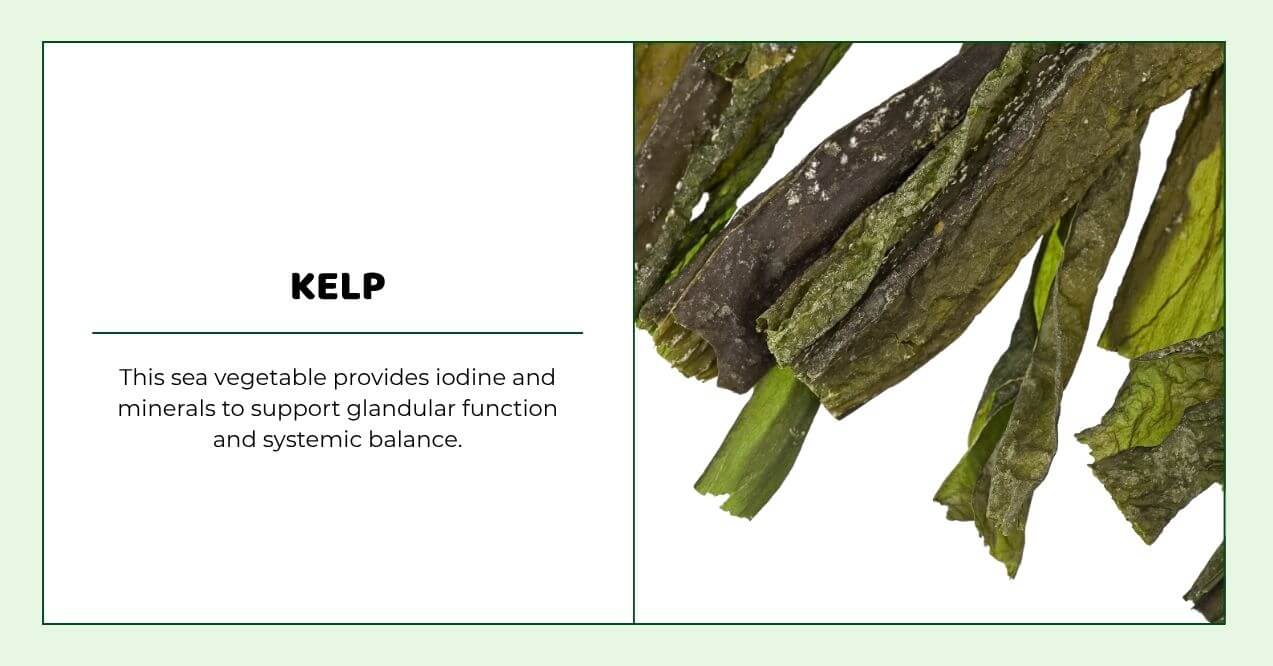
Kelp is a sea vegetable rich in natural iodine. These minerals may support glandular function and systemic balance. The seaweed potentially contributes to internal energy regulation.
Kelp’s mineral content includes compounds supporting metabolic processes. The ingredient adds a nutritional dimension beyond herbal components. Its inclusion helps round out the formula’s mineral profile.
8. Rutin
Rutin is a plant-based flavonoid found in many fruits. This compound may help strengthen capillaries and maintain vessel flexibility. Its action potentially supports healthy circulation and vascular tone.
Rutin complements other herbs by focusing on vessel structural integrity. The flavonoid may help reduce fluid retention in tissues. Its presence boosts the formula’s focus on microcirculation and drainage.
Quick Reference: Ingredient Functions
| Ingredient | Primary Function | Origin |
| Echinacea | Immune support & lymph flow | Flowering plant |
| Bromelain | Enzyme that aids fluid drainage | Pineapple extract |
| Dandelion | Promotes water balance | Root herb |
| Cleavers | Supports natural tissue drainage | Traditional lymphatic herb |
| Burdock | Internal cleansing aid | Root plant |
| Lemon Peel | Antioxidant & vascular support | Citrus peel |
| Kelp | Mineral-rich, supports balance | Sea vegetable |
| Rutin | Capillary & vessel integrity | Flavonoid compound |
How the Ingredients Work Together
This blend represents more than a random collection of herbs. Each ingredient was selected to boost the others’ effects. The formula demonstrates how traditional knowledge applies to modern wellness goals.
Bromelain, for example, may increase absorption of herbal compounds. This enzyme potentially helps your body utilize other plant ingredients efficiently. Dandelion and burdock work together supporting both liver and lymphatic function.
The combination of flavonoids with lymphatic herbs addresses multiple fluid aspects. Kelp provides minerals that may support metabolic processes involved in drainage. This approach potentially offers more support than single ingredients alone.
Where Supplements Fit into Your Routine
Ingredients matter, but so does how you use them. Supplements work best when integrated into a balanced wellness routine. Consistency tends to produce better results than sporadic use.
Consider pairing your supplement routine with adequate hydration. Water helps your lymphatic system move fluid through tissues. Light movement and stretching may also support drainage processes.
Lymphatic drainage supplements offer targeted support for your body’s fluid management systems. These formulas typically combine herbs like echinacea and dandelion with enzymes. The collection includes powders and formats designed to fit different lifestyles. Each product focuses on maintaining healthy lymphatic flow and drainage pathways.
Supplements promote function but don’t replace healthy habits. They work alongside your body’s existing systems. Think of them as supportive tools rather than standalone solutions.
For additional approaches to lymphatic wellness, explore essential oils for lymphatic drainage options.
Is Lymph Go Safe to Take?
This formula uses natural ingredients with traditional safety profiles. Most people tolerate these herbs and enzymes well. However, individual responses can vary based on sensitivities and health status.
Many people researching lymphatic health also wonder, “should I go to urgent care for swollen lymph nodes?” — usually, mild temporary swelling related to normal immune activity doesn’t require emergency care. However, persistent or painful swelling should always be evaluated by a healthcare provider.
Start with the suggested serving size to assess your tolerance. Be aware of potential sensitivities to iodine, citrus compounds, or enzymes. If you experience any unusual responses, discontinue use immediately.
Conclusion
Transparency in formulation builds trust between brands and consumers. This breakdown of the Lymph Go formula shows exactly what you’re getting.
Each ingredient serves a clear purpose in supporting lymphatic function. The combination reflects both traditional use and modern knowledge of botanicals. Clean labels and straightforward Lymph Go ingredients list make choices easier.
Lymph Go offers a researched approach to daily lymphatic support with its powder formula.
Supplements containing cleavers, red root, and echinacea may support lymphatic function. Enzyme-based ingredients like bromelain potentially aid fluid drainage. Look for formulas with multiple ingredients rather than single herbs. Individual needs vary, so consider your specific wellness goals when selecting products.
Stay well-hydrated and engage in regular light movement or stretching. Dry brushing and lymphatic massage may help stimulate drainage. Herbs like dandelion, burdock, and cleavers potentially support natural cleansing processes. Combining these approaches with adequate sleep creates conditions for lymphatic function.
The lymphatic system itself contains lymph fluid, white blood cells, and proteins. It’s a network of vessels, nodes, and organs throughout your body. Supplements support this system rather than providing its actual components. Herbs and enzymes in formulas may promote the system’s natural drainage functions.
FAQ
References
